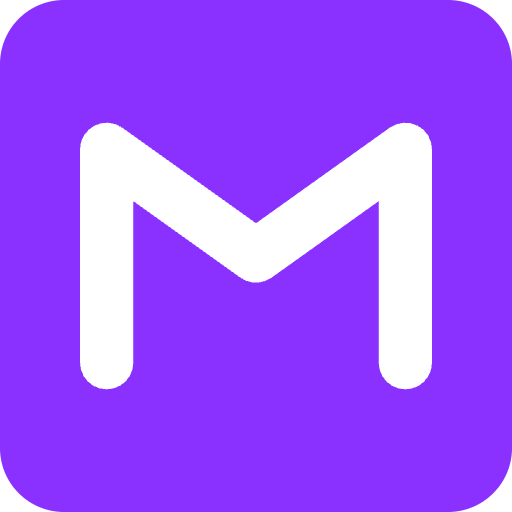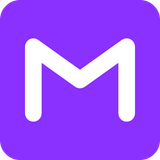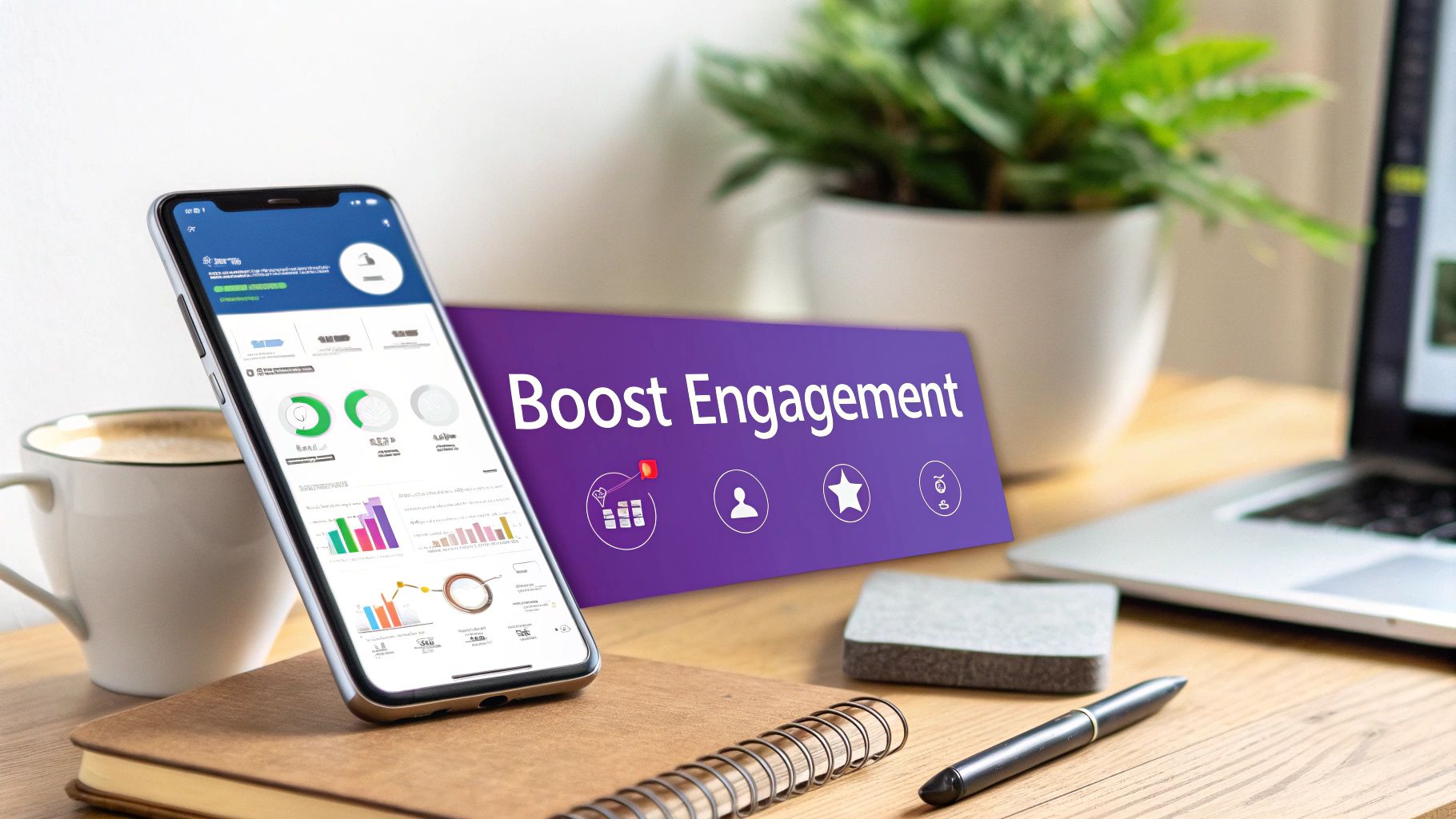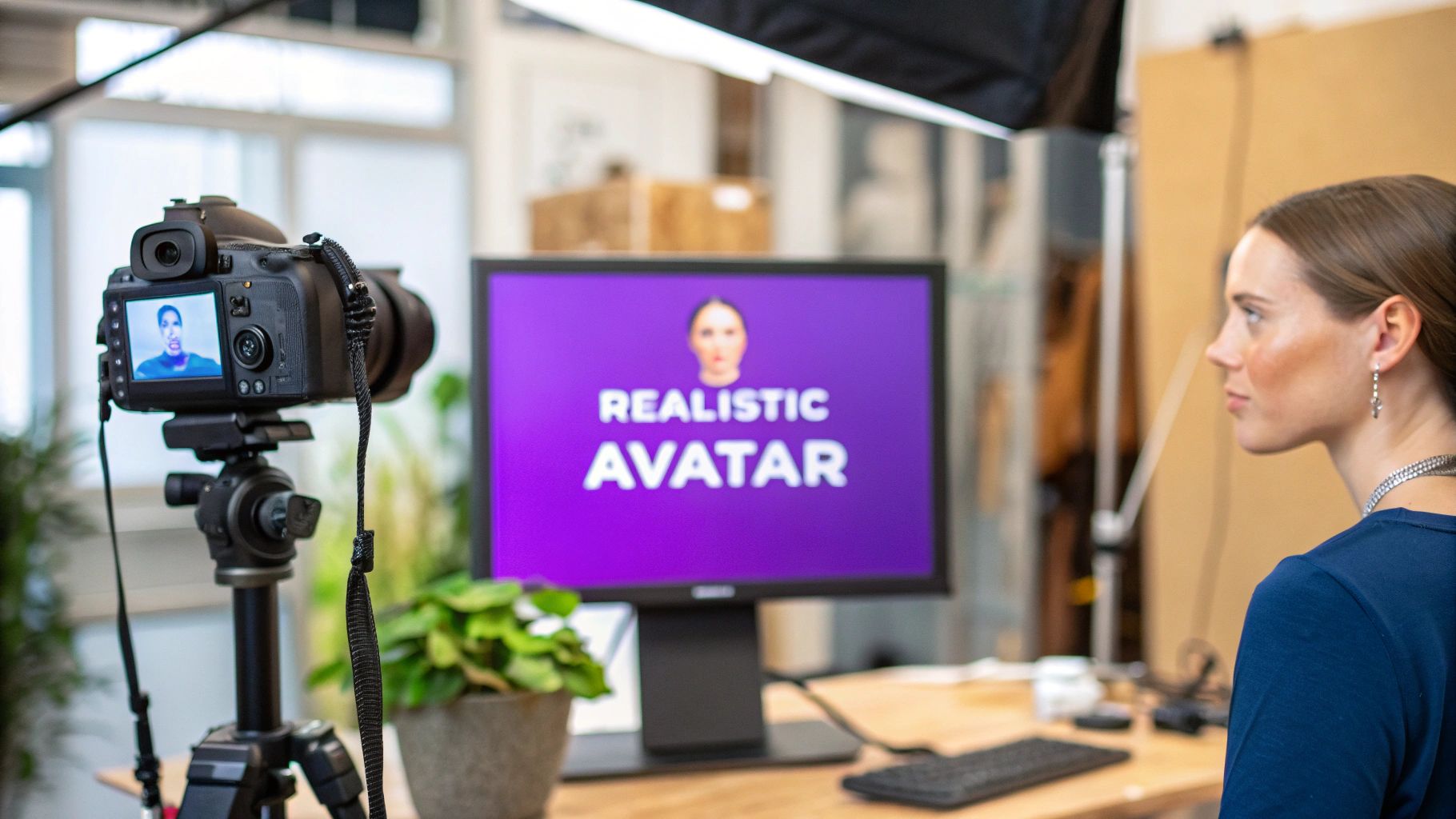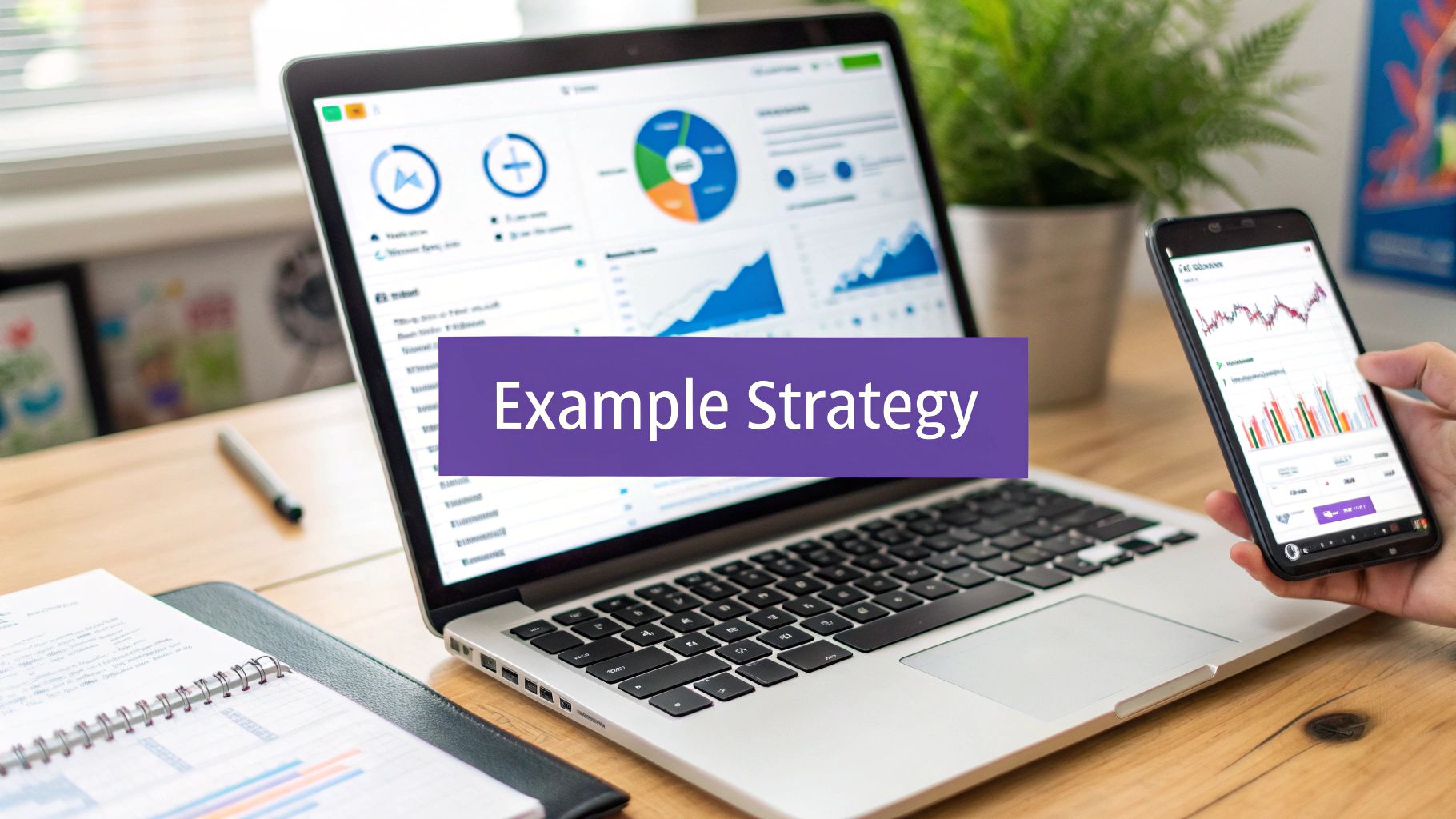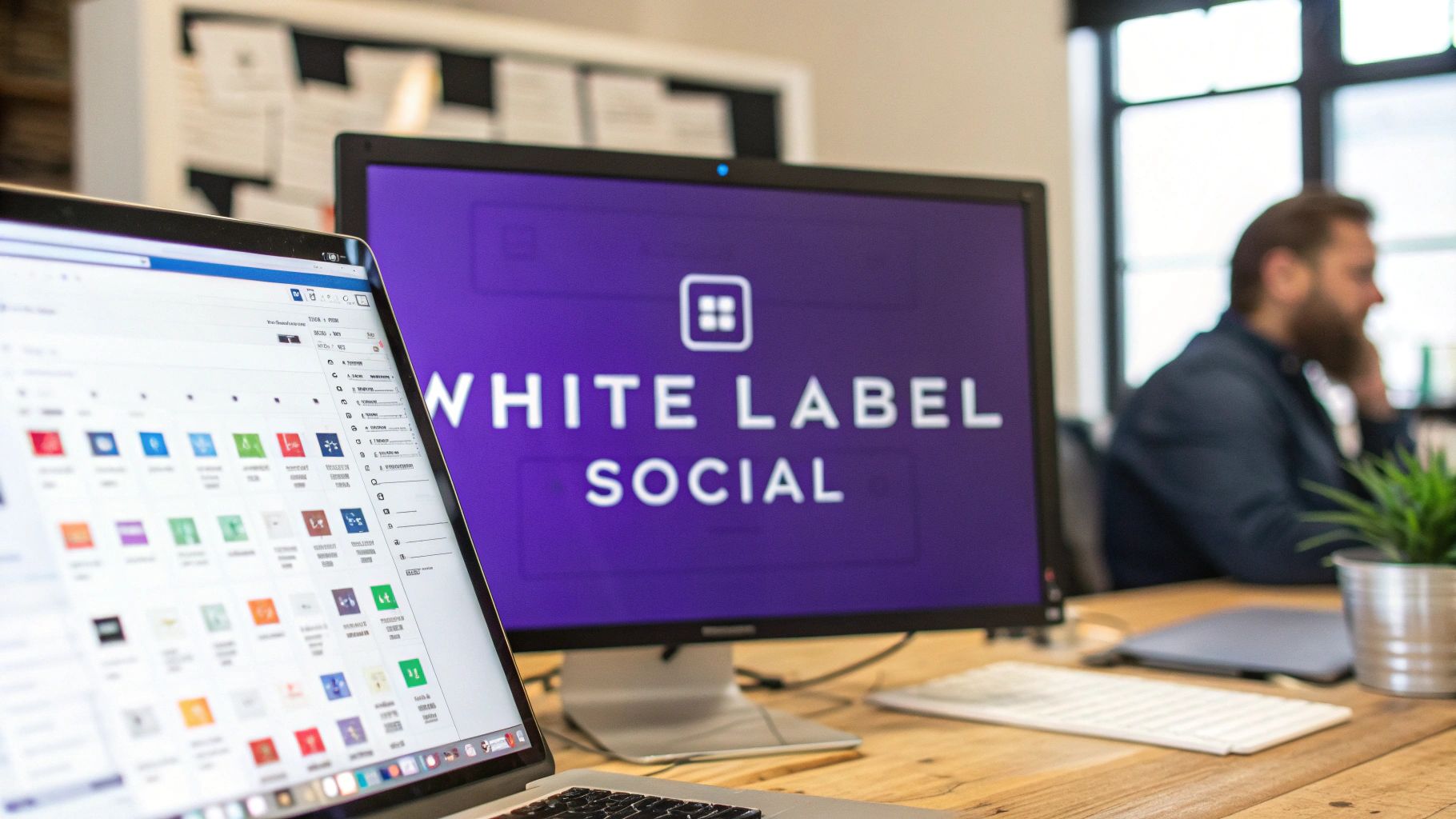7 Crucial Job Interview Preparation Tips for 2025
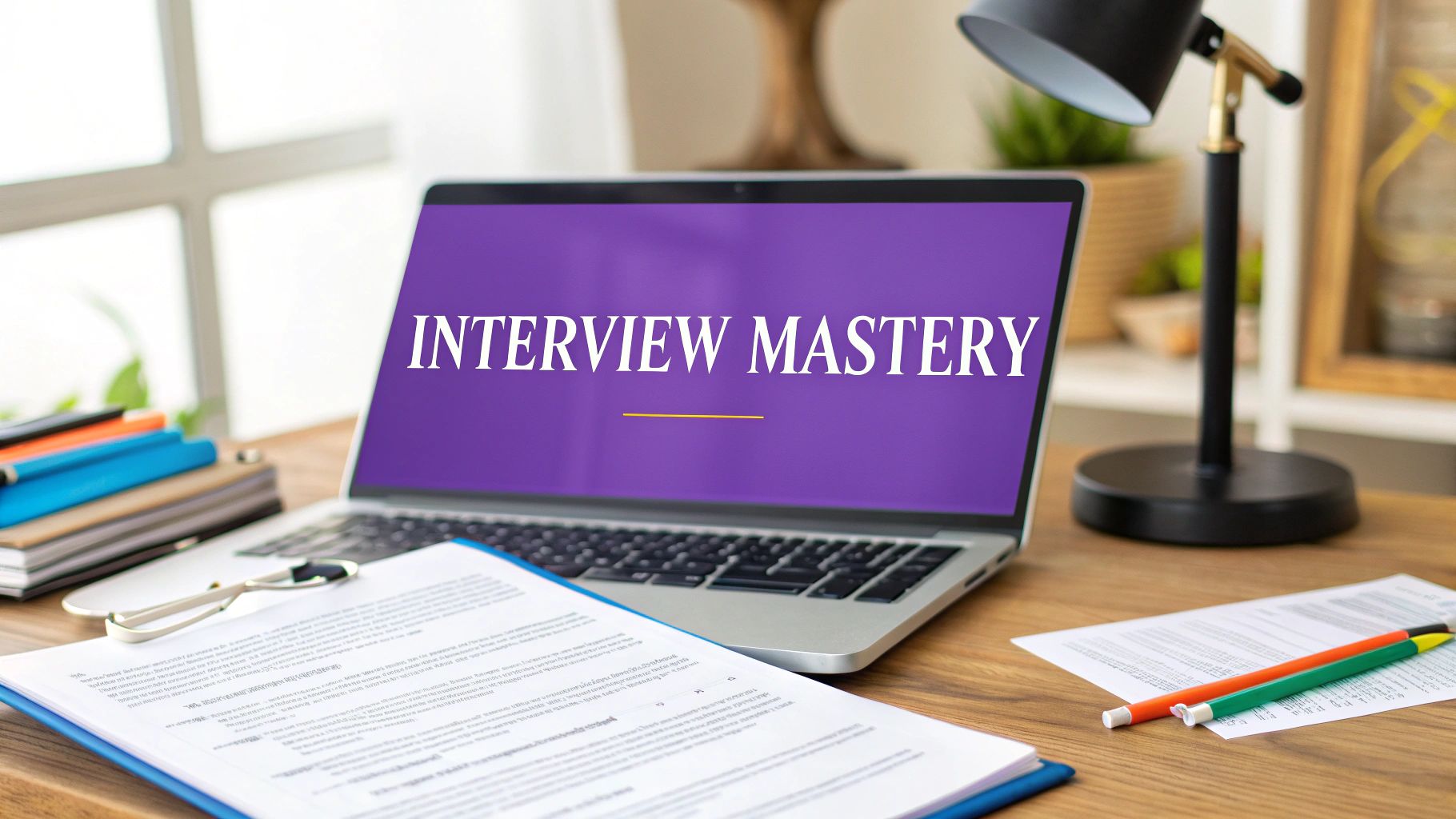
Walking into a job interview unprepared is like navigating a maze blindfolded. The modern hiring process demands more than just a polished resume; it requires a strategic approach that showcases your skills, demonstrates cultural alignment, and proves your unique value. This comprehensive guide moves beyond generic advice, offering seven crucial job interview preparation tips designed to give you a definitive edge in any hiring scenario. We will provide a clear blueprint for success, breaking down each element into actionable steps and practical examples.
From deconstructing behavioral questions with precision to strategically negotiating your worth, each tip is a vital component of a comprehensive preparation strategy. For those in specialized fields like product management, this might even involve using targeted resources such as PM interview cheat sheets to master domain-specific challenges. Mastering these core preparation areas will not only build unshakable confidence but also significantly increase your chances of turning a promising interview into a compelling job offer. This article is your roadmap to transforming interview performance from uncertain to undeniable. Let's dive into the steps that will unlock your next career move.
1. STAR Method for Behavioral Interview Questions
Behavioral questions, often starting with "Tell me about a time when...", are designed to gauge your past performance as an indicator of future success. Responding with a vague or rambling story can undermine your credibility. The STAR method provides a simple, powerful framework for structuring your answers, ensuring they are concise, compelling, and directly relevant. This technique is a cornerstone of modern job interview preparation tips because it transforms your experiences into memorable narratives that showcase your skills in action.
How the STAR Method Works
The acronym STAR represents a four-part story structure that guides your response:
- S - Situation: Briefly describe the context. Where were you working, and what was the specific challenge or event you faced? Set the scene for the interviewer.
- T - Task: What was your specific goal or responsibility in that situation? This clarifies your role and what you were expected to achieve.
- A - Action: Detail the specific steps you took to address the task. This is the core of your story, so focus on your contributions and decisions, using "I" statements.
- R - Result: Conclude by explaining the outcome of your actions. Quantify your achievements with metrics whenever possible to demonstrate tangible impact.
For example, companies like Amazon and Google heavily rely on this format to assess candidates against their core principles. A well-constructed STAR response proves you don't just have the right skills; you know how to apply them to produce measurable results.
Mastering Your STAR Stories
To effectively use this method, prepare 8-10 versatile stories from your past experiences that highlight key competencies like problem-solving, leadership, and teamwork. Align these examples with the skills listed in the job description. Practice articulating each story, aiming for a delivery time of one to two minutes to keep the interviewer engaged.
The following infographic illustrates the streamlined flow of a powerful STAR response.
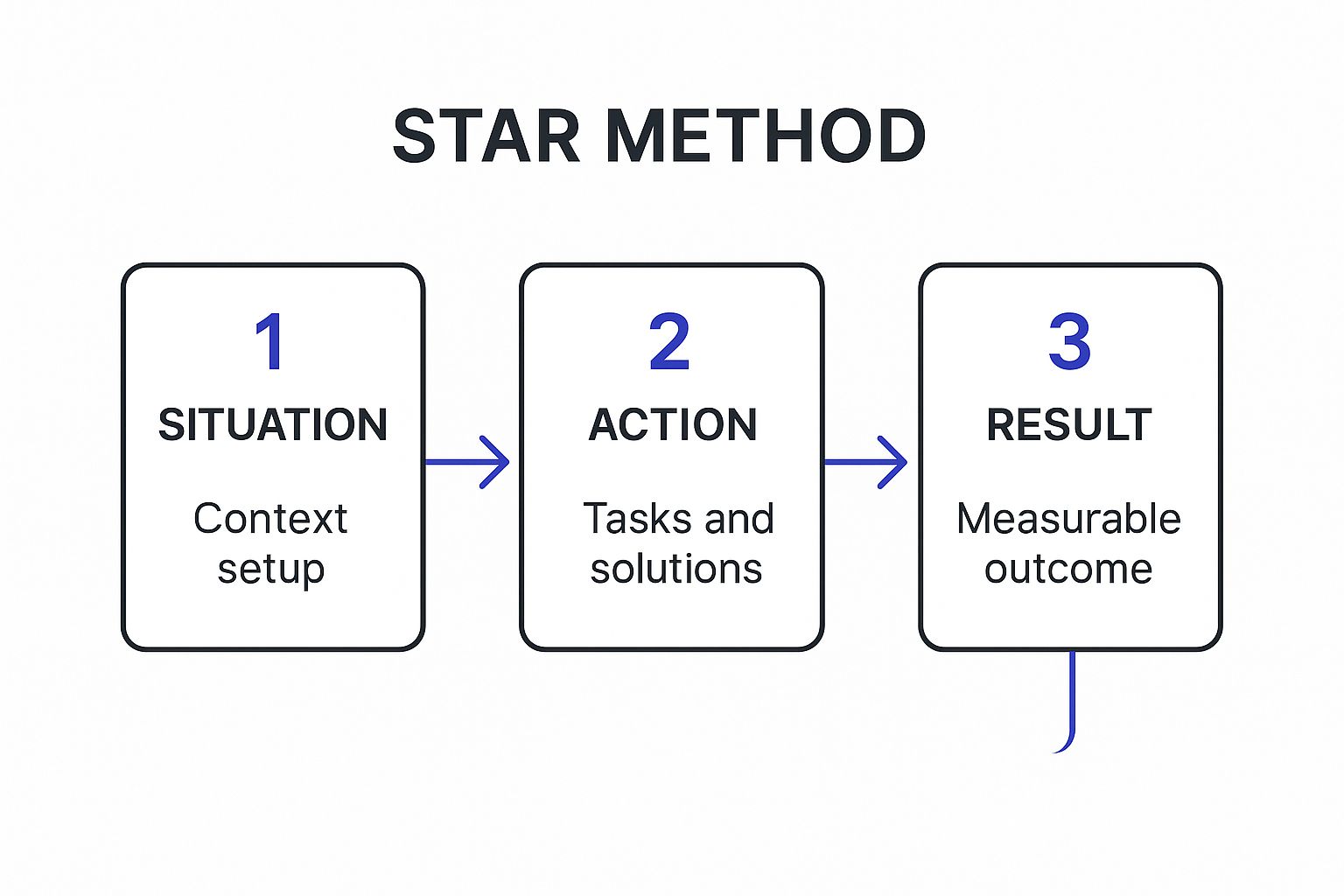
This process flow highlights how each component logically builds upon the last, guiding the listener from context to a clear, impactful conclusion.
2. Company Research and Cultural Alignment
Walking into an interview without knowing the company's mission, values, and recent activities is a significant misstep. Comprehensive company research goes beyond a quick glance at the homepage; it involves a deep dive into the organization's identity, market position, and workplace culture. This preparation demonstrates genuine interest and allows you to articulate exactly how you fit into their vision. It's a critical component of effective job interview preparation tips because it empowers you to tailor your answers and ask intelligent questions that resonate with the hiring manager.

How to Conduct Effective Research
A multi-faceted research strategy ensures you gather a well-rounded view of the organization. Your goal is to understand not just what the company does, but why it does it and how it operates internally.
- Go Beyond the "About Us" Page: Start with the company website, but also explore its official blog, press releases, and annual reports. Look for recurring themes, stated values, and recent milestones.
- Analyze Their Digital Footprint: Review the company's LinkedIn page, paying attention to what they share, recent hires, and the profiles of team members. This provides insight into their priorities and people.
- Seek Unfiltered Perspectives: Use platforms like Glassdoor and Blind to read reviews from current and former employees. This can reveal valuable information about leadership style, work-life balance, and internal culture.
- Stay Current with News: Search for recent news articles, interviews with executives, or industry analysis featuring the company. Understanding their latest challenges and successes shows you're engaged and up-to-date.
For instance, if interviewing at Tesla, you should be prepared to discuss their mission to accelerate the world's transition to sustainable energy. Similarly, understanding a startup's recent funding round signals that you're aware of their growth trajectory and the pressures that come with it.
Aligning Your Story with Their Culture
Once your research is complete, the next step is to connect your personal values and professional experiences to what you've learned. Prepare specific examples that demonstrate this alignment. If the company values "radical transparency," have a story ready about a time you openly communicated a project setback and the positive outcome. If they prioritize "customer obsession," detail an instance where you went above and beyond for a client.
This approach also helps you formulate insightful questions for the interviewer, moving beyond generic queries. You can also leverage this research to build professional relationships by referencing the interviewer's own work or background, creating a more meaningful connection. This deep level of preparation proves you aren’t just looking for any job; you are pursuing a role at this specific company.
3. Mock Interview Practice Sessions
Rehearsing answers in your head is one thing, but articulating them under pressure is a completely different challenge. Mock interviews simulate the real interview environment, providing a crucial opportunity to practice your delivery, manage nerves, and receive direct feedback on your performance. This hands-on approach is one of the most effective job interview preparation tips because it moves your preparation from theory to application, building both competence and confidence before you step into the real meeting.
How Mock Interviews Work
A mock interview is a practice session where you answer questions from a friend, mentor, or professional coach who plays the role of the interviewer. The goal is to replicate the interview conditions as closely as possible, from the types of questions asked to the formal setting. This process helps you identify weak points in your answers, refine your storytelling, and get comfortable with the conversational flow.
- Setup: Find a practice partner or use a service. Provide them with the job description and your resume so they can tailor their questions.
- Execution: Treat the session as a real interview. Dress professionally, eliminate distractions, and give your most thoughtful responses to both behavioral and technical questions.
- Feedback: After the session, your partner provides constructive criticism on your answers, communication style, body language, and overall presentation.
Platforms like Pramp specialize in peer-to-peer mock interviews for tech roles, while many university career centers and professional coaches offer structured sessions. These practices are especially valuable for those navigating a significant career transition, where articulating transferable skills is key. To go deeper, explore these career change tips to better frame your experience.
Mastering Your Mock Interview Sessions
To get the most out of your practice, approach each session with a clear goal. Don't just go through the motions; focus on specific areas for improvement. Start with a trusted friend and gradually move to more formal or challenging interviewers to build resilience.
Aim to record your sessions on video. Watching yourself later provides invaluable insights into your non-verbal cues, such as fidgeting or lack of eye contact, and verbal tics like using filler words. This self-assessment, combined with external feedback, is a powerful combination for polishing your delivery and ensuring you make a strong, professional impression on interview day.
4. Strategic Question Preparation for the Interviewer
The end of an interview, when the hiring manager asks, "Do you have any questions for me?", is not just a formality; it's a critical opportunity. Preparing thoughtful, strategic questions demonstrates genuine interest, critical thinking, and intellectual curiosity. It shifts the dynamic from a one-sided interrogation to a two-way conversation, allowing you to evaluate the company while reinforcing your suitability for the role. This part of your job interview preparation tips toolkit is essential for making a lasting, positive impression.
How Strategic Questions Work
Well-crafted questions serve a dual purpose: they provide you with vital information and they showcase your analytical abilities. Instead of asking about information easily found online, focus on questions that reveal insights into company culture, team dynamics, and future direction. This approach positions you as a proactive, forward-thinking candidate who is already considering how they will contribute and succeed. Mastering the art of inquiry is vital; learn how to ask better questions to transform this part of the conversation.
Your questions should be tailored to the interviewer's role. For instance, you might ask a hiring manager about performance expectations, while a potential teammate could offer insights into the day-to-day collaboration style. This demonstrates that you understand organizational structure and respect their unique perspective. Just as a well-written cover letter shows you've done your homework, your questions prove you're engaged in the moment. You can learn more about how to demonstrate your preparedness by exploring our guide on crafting an effective cover letter.
Mastering Your Questions
To implement this effectively, prepare 8-12 questions categorized by topic. This ensures you have relevant inquiries regardless of who you are speaking with or what has already been covered.
- About the Role: "What does success look like in this position in the first 90 days?" "What are the biggest challenges someone in this role will face?"
- About the Team: "Can you describe the team's communication and collaboration style?" "What kind of professional development opportunities are available to the team?"
- About the Company: "How has the company adapted to recent changes in the industry?" "What are the company's most important priorities for the next year?"
Always listen carefully to the interviewer's responses and be prepared to ask relevant follow-up questions. This shows you are not just reading from a script but are actively engaged in a meaningful dialogue.
5. Professional Appearance and Body Language Optimization
Your skills and experience are critical, but the first impression you make is often visual and non-verbal. Professional appearance and body language optimization focuses on how you present yourself physically, from your attire to your posture, to convey confidence, competence, and respect. This element is one of the most vital job interview preparation tips because it communicates your professionalism and seriousness about the opportunity before you even say a word, setting a positive tone for the entire interaction.
The Components of a Professional Impression
Creating a strong first impression involves two key areas: your appearance and your non-verbal cues. Both must be managed strategically to align with the company's culture and the expectations of the role.
- Appearance: This includes your choice of attire, grooming, and overall neatness. The goal is to dress in a way that shows respect for the interview process and fits the company's environment, whether it's business formal for a corporate law firm or business casual for a tech startup.
- Body Language: This encompasses your posture, eye contact, hand gestures, and facial expressions. Confident body language, such as sitting upright, maintaining steady eye contact, and offering a firm handshake, can significantly enhance your perceived credibility and trustworthiness.
For example, a candidate for a creative agency might opt for smart casual attire that shows personality, while a candidate for a finance role should default to a conservative suit. Similarly, in a video interview, a well-lit space and a professional background are just as important as your clothing. Your virtual presentation, including how you look on camera, is now a crucial part of your professional image; learn more about crafting that image with these professional headshot tips.
Mastering Your Presentation
To optimize your appearance and body language, research and practice are essential. Don't leave your presentation to chance; plan it as carefully as you plan your answers to interview questions.
Aim to research the company's dress code by looking at their website's "About Us" page, their social media presence, or by asking the HR contact directly. Practice confident posture by sitting in your interview chair beforehand and even recording yourself to check for nervous habits like fidgeting or slouching. A deliberate and polished presentation demonstrates attention to detail and a high level of professionalism.
6. Technical Skills Assessment Preparation
For roles in tech, engineering, finance, or consulting, your technical proficiency is non-negotiable. Employers validate this through skills assessments, which can range from live coding challenges and case studies to portfolio presentations. Proactive Technical Skills Assessment Preparation is crucial because it directly tests your ability to perform the core functions of the job. Excelling here proves you have the practical, hands-on expertise the company needs, moving your application beyond resume claims to tangible proof of skill.
How Technical Assessments Work
Technical assessments are designed to simulate real-world job tasks in a controlled, often timed, environment. The format varies significantly by industry and role:
- Coding Challenges: Software engineers often face algorithmic problems on platforms like LeetCode or HackerRank to test problem-solving and coding efficiency.
- Case Studies: Consulting and business analyst roles use case studies to evaluate analytical reasoning, business acumen, and structured thinking.
- Portfolio Reviews: Designers, writers, and other creative professionals are asked to present and defend work from their portfolio, demonstrating their creative process and results.
- Skill Demonstrations: A system administrator might be asked to troubleshoot a simulated network issue, or a data analyst might need to clean and analyze a dataset.
These assessments are not just about getting the right answer; they are about demonstrating your thought process. Companies like Google and Microsoft use them to see how you approach a problem, communicate your logic, and handle pressure.
Mastering Your Technical Assessment
Success in these evaluations comes from targeted practice and strategic preparation. Start by researching the specific types of assessments the company typically uses for your role; platforms like Glassdoor often have user-submitted examples.
Practice solving relevant problems under timed conditions to build both speed and accuracy. For coding challenges, actively explain your logic out loud as you work, a key skill for live interviews. For case studies, master a few core frameworks that you can adapt to different business scenarios. By treating your preparation like a training regimen, you ensure you can perform at your best when it counts. Leveraging modern tools can also be a game-changer; discover the best AI tools for job seekers to help streamline your research and practice.
7. Salary Negotiation Strategy and Market Research
While the interview focuses on proving your value, the final stage often involves a salary discussion where you must advocate for fair compensation. Entering this conversation unprepared can leave you underpaid and undervalued. A well-defined salary negotiation strategy, backed by thorough market research, is one of the most critical job interview preparation tips for ensuring your new role meets your financial expectations and reflects your true market worth.
How to Build Your Negotiation Strategy
A strong strategy is built on data, not assumptions. It involves understanding your worth, knowing the company's likely budget, and preparing to articulate your case professionally.
- R - Research: Gather salary data from multiple reliable sources. Websites like Glassdoor, PayScale, and Levels.fyi provide industry benchmarks based on role, experience level, and geographic location. Look for recently reported salaries to ensure the data is current.
- A - Assess: Evaluate the complete compensation package, not just the base salary. Consider bonuses, stock options, health insurance, retirement contributions, and paid time off. A lower base salary might be acceptable if the benefits package is exceptional.
- P - Prepare: Define your ideal salary, your acceptable range, and your walk-away number. Prepare clear, concise talking points that justify your desired compensation, linking your skills and accomplishments directly to the value you will bring to the company.
For example, a software engineer might use data from Levels.fyi to see that similar roles at competing companies offer a higher equity component. They can use this research to negotiate for a larger stock grant, even if the base salary is fixed.
Mastering the Negotiation Conversation
To effectively implement your strategy, timing and delivery are crucial. Avoid discussing salary too early in the process; wait until the employer has made a firm offer. When the conversation happens, remain professional, confident, and collaborative, framing it as a discussion to find a mutually beneficial agreement.
Practice your negotiation script with a mentor or career coach. Prepare for various scenarios, such as what to do if the initial offer is lower than expected or if the company cannot meet your base salary request. Having alternative proposals ready, like a signing bonus or a remote work arrangement, demonstrates flexibility and a proactive problem-solving mindset. This preparation ensures you can navigate the discussion calmly and secure a compensation package that truly values your expertise.
7 Key Job Interview Prep Tips Comparison
| Item | 🔄 Implementation Complexity | ⚡ Resource Requirements | 📊 Expected Outcomes | 💡 Ideal Use Cases | ⭐ Key Advantages |
|---|---|---|---|---|---|
| STAR Method for Behavioral Interview Questions | Moderate – requires preparation and practice | Low – only time and mental effort | Clear, structured, measurable storytelling | Behavioral interview questions across industries | Keeps answers focused; highlights impact |
| Company Research and Cultural Alignment | High – involves extensive information gathering | Medium – access to multiple sources | Informed, tailored interview responses | All interviews to assess fit and show interest | Demonstrates initiative; uncovers red flags |
| Mock Interview Practice Sessions | Medium – set up sessions and coordination | Medium to high – partner/coach required | Improved confidence, timing, and communication skills | Preparing for real interviews across roles | Builds confidence; provides feedback |
| Strategic Question Preparation for the Interviewer | Low to medium – question crafting | Low – research and reflection | Engaged dialogue; insightful information gained | Final rounds; candidate-driven discussions | Shows engagement; reveals culture insight |
| Professional Appearance and Body Language Optimization | Low – awareness and practice required | Low – attire and grooming | Positive first impression and increased confidence | All face-to-face or video interviews | Reinforces professionalism non-verbally |
| Technical Skills Assessment Preparation | High – intensive practice and study | High – time, platforms, materials | Demonstrated job-specific technical competence | Technical roles requiring coding or case skills | Validates skills; builds practical confidence |
| Salary Negotiation Strategy and Market Research | Medium – research and preparation | Medium – research tools and practice | Better compensation offers and informed negotiations | Post-offer stage or job change salary discussions | Maximizes earnings; demonstrates professionalism |
From Preparation to Offer: Your Final Checklist for Success
Navigating the journey from a promising application to a firm job offer is less about luck and more about mastering a repeatable process. The comprehensive job interview preparation tips detailed in this guide are your strategic blueprint for turning opportunity into achievement. By moving beyond surface-level advice, you've learned how to transform your experiences into compelling narratives, align your professional brand with company culture, and walk into any interview room with earned confidence.
Synthesizing Your Strategy
True preparation is about integration, not just isolated practice. The real power of these techniques emerges when you weave them together into a cohesive strategy. Think of it this way:
- Your research on the company and its culture (Tip #2) directly informs the questions you ask the interviewer (Tip #4), demonstrating genuine interest.
- The STAR method (Tip #1) becomes the framework for answering behavioral questions during your mock interviews (Tip #3), allowing you to refine your stories until they are concise and impactful.
- Your salary negotiation strategy (Tip #7) is built upon the value you demonstrate through your technical skills preparation (Tip #6) and the professional polish of your appearance and body language (Tip #5).
Each element supports and amplifies the others. The goal is not just to answer questions correctly, but to present a complete, compelling picture of yourself as the ideal candidate-a problem-solver who is prepared, professional, and perfectly suited for the role.
From Practice to Performance
The transition from preparation to performance hinges on one critical element: internalization. You don't want to sound like you're reciting a script. The aim is to practice so thoroughly that your answers, stories, and questions become a natural part of your professional vocabulary. This is where consistent effort pays dividends. Don't just read about the STAR method; write out five of your best career stories using it. Don't just think about what to ask; have a list of ten potential questions ready.
Mastering these job interview preparation tips is an investment in your career trajectory. It empowers you to take control of the hiring process, ensuring you not only secure a position but land one that aligns with your skills, ambitions, and financial goals. This deliberate preparation is what separates a good candidate from an unforgettable one. It’s the final, crucial step that transforms a hopeful applicant into a hired professional. Embrace the process, commit to the practice, and walk into your next interview ready to succeed.
Ready to ensure your first impression is as strong as your interview performance? Your digital presence is often the first thing a recruiter sees. Use MakerBox to craft a professionally optimized social media bio and profile that captures attention and complements your stellar interview preparation. Start building a powerful professional brand today at MakerBox.
